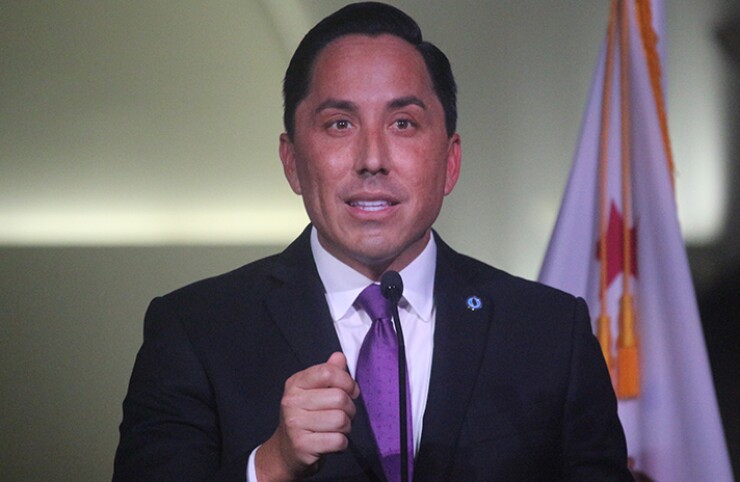San Diego Mayor Todd Gloria's $5.65 billion proposed budget taps borrowing and other short-term fixes to close a structural deficit.
One-time maneuvers include eliminating $30 million in scheduled reserve contributions and borrowing $25 million, rather than using cash, to fund infrastructure projects.
Gloria's budget would increase spending on homeless prevention programs, street paving and flood abatement, while cutting non-personnel expenses from department budgets, the city's free Wi-Fi and the Office of Immigrant Affairs.
"We were able to avoid the most dire cuts by using one-time measures we cannot responsibly repeat next year, so a major part of this process will be how we reckon with our structural deficit," Gloria said.

While the mayor acknowledged his budget depends on one-time fixes, he said, this would allow the city to continue progress made toward reversing years of underinvestment in the city's infrastructure, workforce and services.
"With revenue down and costs rising, we had to make difficult choices in order to sustain funding for key priorities: addressing homelessness and building more housing; fixing roads and other critical infrastructure; and keeping you safe," Gloria said.
Gloria released the budget Friday, but he will formally present it to the City Council on April 22, kicking off budget negotiations. The mayor will on May 14 release a revised budget based on those discussions, with the aim of approving a final budget by June 30.
The mayor said the proposal would close a $200 million deficit in the city's annual $2 billion general fund budget. The city has depleted $550 million in federal pandemic aid that had alleviated the
The proposed budget diverts unused balances from targeted special funds, such as the Community Equity Fund, into the general fund, suspends contributions to discretionary grant program accounts and deploys other one-time measures.
The budget plan increases homelessness spending to $110 million in the 2024-25 fiscal year that starts July 1, up from $92 million approved for the current fiscal year.
Two programs aimed at reducing homelessness would receive $26.6 million in additional funding. One proposal would turn the H Barracks, the city-owned former Navy land adjacent to the San Diego International Airport, into 200 spaces for the city's Safe Parking Program, doubling its number of spots.
The second proposal, announced by the mayor April 4, involves signing a 35-year lease on warehouse space in downtown San Diego to provide a 1,000-bed homeless shelter, which Gloria said would be the city's largest by far. The project would tap state, local and federal funds as well as contributions from local donors.
The proposal was scheduled to be heard by the City Council's Land Use and Housing Committee Thursday, but was reportedly
The two programs would triple shelter options for homeless San Diegans, Gloria said.
The mayor also unveiled a street paving management plan that he said would allow the city to proactively pinpoint funding needs to prioritize spending.
The proposal spends $85.1 million on flood control and green infrastructure projects on top of the investments made tapping the federal Water Infrastructure Finance and Innovation Act program. WIFIA loans will cover 49% of up to $733 million in stormwater upgrades, which range from pipeline replacements and pump station repairs to comprehensive watershed restoration, according to the mayor.
City leaders will be taking up two tax increase proposals that could make crafting next year's budget easier.
A 1 percentage point sales tax hike could generate an estimated $400 million annually and a stormwater fee increase through a parcel tax could bring in $100 million for flood prevention.
The City Council will vote this summer on whether to place the measure before voters on November's ballot.
"I commend Mayor Gloria for proposing a balanced budget while continuing to invest in streets, homeless services and public safety," said City Councilmember Kent Lee, a Democrat and chair of the Budget and Government Efficiency Committee.
San Diego holds AA ratings from both Fitch Ratings and S&P Global Ratings, and Aa2 from Moody's Ratings. All assign a stable outlook.





